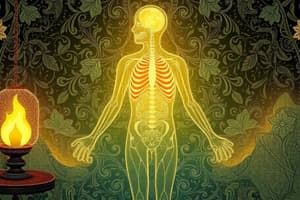Podcast
Questions and Answers
What is Homeostasis?
What is Homeostasis?
Homeostasis refers to the processes that keep the internal conditions of the body within certain narrow limits.
What conditions does your body maintain for optimal cell function? (Select all that apply)
What conditions does your body maintain for optimal cell function? (Select all that apply)
- Glucose concentration (correct)
- Blood pressure
- Water levels (correct)
- Temperature (correct)
What is the normal range for body temperature in Celsius?
What is the normal range for body temperature in Celsius?
36 – 38ºC
What are the physiological processes that help maintain internal equilibrium?
What are the physiological processes that help maintain internal equilibrium?
What is vasodilation?
What is vasodilation?
What is vasoconstriction?
What is vasoconstriction?
What mechanisms do humans use to cool the body down? (Select all that apply)
What mechanisms do humans use to cool the body down? (Select all that apply)
What mechanisms do humans use to warm the body up? (Select all that apply)
What mechanisms do humans use to warm the body up? (Select all that apply)
The nervous and endocrine systems are responsible for homeostatic control mechanisms.
The nervous and endocrine systems are responsible for homeostatic control mechanisms.
Flashcards are hidden until you start studying
Study Notes
Homeostasis Overview
- Refers to processes maintaining internal body conditions within narrow limits.
- Optimal conditions for body cells include temperature, water levels, and glucose concentration.
Importance of Homeostasis
- Claude Bernard noted constancy of the internal environment is essential for free life.
- Mechanisms ensure all necessary life conditions are maintained.
Standard Equilibrium Values
- Body temperature: maintained between 36 - 38ºC.
- Carbon dioxide concentration: normally between 35 - 45 mmHg.
- Blood pH: stable range of 7.35 - 7.45.
- Blood glucose levels: optimal range of 75 - 95 mg/dL.
- Water balance varies by individual body size.
Factors Causing Heat Gain
- Heat absorbed from the environment via radiation and conduction.
- Excess fat deposits hinder heat loss from physical activity.
- Intense exercise combined with heavy clothing increases body temperature.
Mechanisms for Cooling the Body
- Sweating: Sweat evaporation cools the skin as it draws heat away.
- Vasodilation: Blood vessels dilate, bringing blood closer to the skin surface, facilitating heat loss; causes reddening of the skin.
Factors Causing Heat Loss
- Wind chill accelerates heat loss through convection.
- Higher heat loss occurs with wet conditions, inactivity, or inadequate clothing.
Maintaining Temperature in Cold Environments
- Human body temperature remains stable between 36ºC and 38ºC, even in extreme cold (-2ºC).
Mechanisms for Warming the Body
- Vasoconstriction: Capillaries constrict to retain blood warmth, preventing heat loss from the skin surface.
- Piloerection: Hairs stand up, trapping air which becomes warmed, providing insulation.
- Shivering: Muscles contract uncontrollably to generate heat.
Homeostatic Control Systems
- Governed by the nervous and endocrine systems.
- Communication systems coordinate body activities through electrical and chemical messages.
Studying That Suits You
Use AI to generate personalized quizzes and flashcards to suit your learning preferences.




